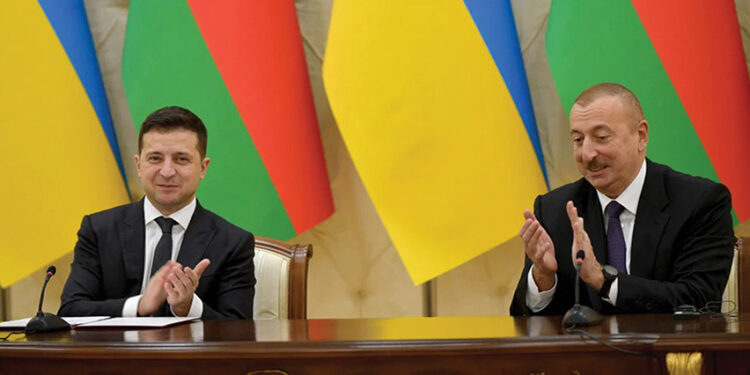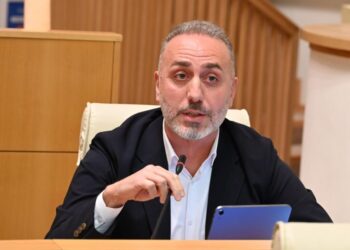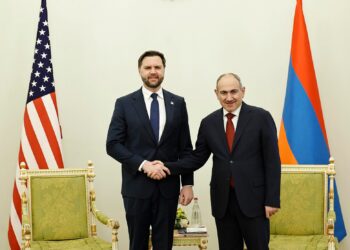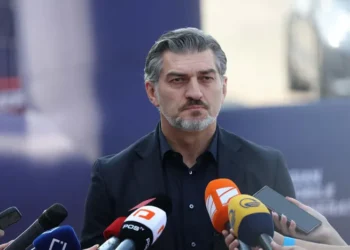Kyiv would be sorely mistaken to expect greater sympathy from the Aliyev family dictatorship as bilateral relations between Baku and Moscow hit rock bottom.
Two weeks ago, two ethnic Azeri brothers, Huseyn Safarov (60) and Ziyaddin Safarov (55), were rounded up alongside 50 of their fellow compatriots in Yekaterinburg, and were eventually tortured to death by the Russian Federal Security Service (FSB) as part of an apparent counterterrorism operation dating back to 2001. It is worth noting that this Kremlin-led provocation came on the heels of a Russian surface-to-air ‘Pantsir-S’ missile downing Azerbaijan Airlines (AZAL) Flight 8243 near Aktau in Southwestern Kazakhstan seven months ago, and Vladimir Putin’s subsequent refusal to admit any wrongdoing by his paranoid military forces or even offer the victims’ families blood money.
Rather than giving diplomacy a chance and being met with signature Kremlin obfuscation once again, Azerbaijan’s President Ilham Aliyev took matters into his own hands this time around and had local authorities raid the Baku bureau of Russian propaganda news agency Sputnik, following which seven executives were arrested on fraud, espionage and money-laundering charges. A further eight Russian “IT specialists” based in the Azeri capital were detained for their involvement in cybercrime activity and drug-running. Meanwhile, Azerbaijan’s Ministry of Culture scrapped all scheduled Russian concerts, exhibitions and privately-held events in retaliation for what Aliyev described as “targeted extrajudicial killings on the basis of nationality” by Moscow.
To his credit, Ukrainian leader Volodymyr Zelensky wasted no time in reaching out to his Azeri counterpart and expressing solidarity with yet another post-Soviet republic Putin is bent on cutting down to size. That said, whether Russia’s strained ties with Azerbaijan will translate into the latter throwing its weight behind Ukraine is anyone’s guess. After all, there was no such knee jerk reaction from Aliyev when the AZAL plane crash occurred and killed 38 passengers, not to mention anything of the three conditions he put forward that were essentially ignored by Putin. Unlike neighboring Tbilisi, for instance, one would be hard-pressed to find any Ukrainian flags or anti-Russia graffiti in the streets of Baku, no matter how much tensions with Moscow escalate.
Insecure, and lacking popular legitimacy, Aliyev does not want other causes or movements to overshadow the deity-like reverence he commands from the oppressed Azerbaijani masses. This is precisely why the like-minded Gulf Arab sheikhs outlaw pro-Palestine demonstrations and activism in their personal fiefdoms, notwithstanding domestic outrage at Israel’s continued bombardment of Gaza and the West Bank. The fact that Azerbaijan’s land borders have remained closed since the onset of the coronavirus pandemic is a deliberate effort by its ruling clan to keep the Caspian petrostate from becoming a safe haven for exiled Russian and Iranian regime critics.
From Baku’s standpoint, any state-endorsed support for Ukraine, the party whose territorial integrity and right to self-determination was violated by an imperial aggressor, risks backfiring tremendously. For starters, ordinary Azerbaijanis may likewise feel emboldened to demand civil liberties, independent media, fair elections, government transparency and other basic democratic norms that are anathema to the Aliyev dynasty. The 2025 Reporters Without Borders (RSF) index for press freedom ranks Azerbaijan 167th out of 180 countries: lower than Belarus, Cuba, Venezuela and Saudi Arabia. Worse still, taking a more assertive stance with respect to the Russo-Ukrainian crisis, however principled, could thrust Azerbaijan’s flagrant human rights atrocities and untold war crimes during the 2020 Nagorno-Karabakh conflict back into focus. These include ethnically cleansing no less than 100,000 indigenous Armenians from the captured enclave, the systematic erasure of its Orthodox Christian heritage and the ill-treatment of Armenian prisoners of war.
When it comes to foreign policy considerations and goals, Baku’s apathy vis-à-vis closer European integration and limited access to US financial assistance under Section 907 of the Freedom Support Act means it is under no real external pressure or duress to side with Kyiv. Needless to say, Azerbaijan is not pursuing EU Candidacy, an association agreement with Brussels or even visa-free entry to the Schengen Area. Instead, it prefers to maintain a purely transactional, no-nonsense partnership with Europe, underpinned by the steady supply of cheap energy via the Southern Gas Corridor (SCG) and Trans-Adriatic Pipeline (TAP) as an alternative to phased out Russian hydrocarbons.
The Azerbaijani government’s attempts at extricating ideological differences from their cooperation with the EU and the West writ large have, however, not always proven successful. As a means of settling scores with France over its arms sales to Armenia, Baku has sought to whip up anti-colonial sentiment in French overseas dependencies, namely New Caledonia, Mayotte and Guadeloupe, via so-called ‘information warfare’. In terms of negative PR, Aliyev wrought further reputational damage upon himself and his country in Western corridors of power by condemning Czechia-based Azeri PhD candidate Bahruz Samadov to a 15-year prison sentence for alleged “high treason,” while jailing LSE academic Dr. Gubad Ibadoghlu since July 2023 on similar grounds.
Whereas the previous Biden administration was much more vocal about Azerbaijan’s warped conflation of anti-establishment journalists with fifth column saboteurs, and its army’s lawless conduct amid the “liberation” of Nagorno-Karabakh, the current Secretary of State Marco Rubio is facing growing calls from Republicans and Democrats alike to withhold military aid to the South Caucasus nation. Nonetheless, of far greater concern to Aliyev is Azerbaijan’s standing and perception across the Global South, particularly among the BRICS member states and partners.
Despite the theatrical tit-for-tat Aliyev and Putin are engaged in to prove a point to their respective audiences, Azerbaijan cannot afford to burn bridges entirely with Russia. Given that tensions between Baku and Tehran have not fully subsided and, if anything, have somewhat resurfaced as a result of the recent Iran-Israel conflagration, it would be suicidal for Aliyev to make an enemy out of two regional heavyweights and find himself on the receiving end of a Russo-Iranian pincer movement. Beyond the comprehensive strategic partnership Russia and Iran ratified earlier this year, both parties are seeking payback for what they believe to be a Turkish-orchestrated coup that toppled Syria’s House of Assad last December. Aliyev, in that regard and by virtue of his proximity to Türkiye’s Islamist strongman Recep Tayyip Erdogan, is certainly fair game.
Out of hubris, stupidity and sheer contempt for public opinion, Aliyev has made plain the literal daylight robbery he and his immediate relatives were able to get away with by siphoning off Azerbaijan’s national wealth to financial hubs abroad. The notion that resource-poor Armenia has a higher GDP per capita than gas-rich Azerbaijan speaks volumes about the scale of corruption and economic mismanagement taking place under Aliyev’s watch. A 2021 OCCRP report revealed that Azerbaijan’s first family and their close associates own roughly $700 million worth of real estate in London alone, whereas Aliyev’s children have snapped up luxury properties amounting to at least $75 million in Dubai and a $35 million mansion on the outskirts of Moscow.
Just as allowing women to wear mini-skirts, letting alcohol flow freely and embracing religious pluralism in a Muslim-majority country did little to shield the despotic late Shah of Iran from his day of reckoning, or disgraced Syrian dictator Bashar al-Assad for that matter, both the Kremlin and the Islamic Republic could, if pushed, tap into the legitimate grievances of Azerbaijani commoners outside the urban centers who have been short-changed by Aliyev. As though incurring the wrath of Moscow and Tehran is not a grave enough threat to Aliyev’s self-preservation, he has managed to alienate another emerging player on the international arena, India, by openly backing its arch-foe Pakistan in the latest conflagration between the two nuclear-armed South Asian nations.
To some extent, hosting the latest Economic Cooperation Organization (ECO) summit in Khankendi (or Stepanakert) was a shabby ploy by Baku to legitimize Nagorno-Karabakh as undisputed Azerbaijani land in the eyes of Türkiye, Pakistan and the smaller, impoverished “-stans,” just as the Kremlin got its puppet allies Ba’athist Syria and North Korea to officially recognize the Donetsk (DPR) and Luhansk (LPR) “people’s republics” in 2022. As a revanchist police state with no regard for the welfare of its citizens and devoid of any checks and balances to hold its top brass accountable, Azerbaijan is one of the last countries on earth Ukraine should ever look to align itself with. It would be extremely premature to consider Aliyev and his inner circle elite well-wishers of the Ukrainian people in their ongoing fight for democracy and sovereignty.
First published on reinvantage.org.
Op-ed by Saahil Menon














